Are introverts toxic as friends? Well, that’s a bit of a loaded question, isn’t it? As an introvert myself, I can tell you that we’re not all the same, and I definitely don’t consider myself to be toxic and not once have I heard my friends or family members complain about my behavior towards them. However, there are some misconceptions about introverts that may make some people see us in a negative light.
In this blog post, we’ll take a closer look at some of the stereotypes surrounding introverts and whether or not they hold any truth. We’ll also explore what it actually means to be an introvert and why it can actually be a great thing. So, if you’re an introvert who’s tired of being labeled as “toxic,” grab a cup of tea, cozy up in your favorite spot, and let’s get started!
Are Introverts Toxic as Friends?
Are introverts a toxic waste of friendship space? Not exactly! While it’s true that we introverts might not be the first ones to show our dance moves or strike up a conversation with a random stranger, we definitely have their own unique qualities that make them awesome friends. But when it comes to toxicity, introverts can be a mixed bag because we’re also humans, after all. And since we introverts are also honest, we do not hide the fact that we can be toxic as well. Here’s a little survey I did among 39 introverts, see the results for yourself: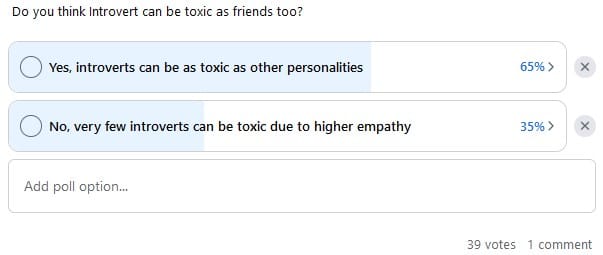
- As per the survey, out of 39 introverts, 25 participants, or 65% introverts think that introverts can be as toxic as other personality types.
- Only 35% of introverts (13 participants) think that very few introverts can be toxic because they have higher empathy.
I agree with the second statement personally because introverts have higher empathy and this is also theorized by this study that suggests that introverts are more inclined to having empathy.
Think about it like this: introverts might not be the flashy sports cars everyone notices, but they’re more like a trusty old pickup truck always there when needed. They’re reliable, and they’ll always have your back no matter what.
Sure, they might not be the most talkative people at the party, but when you need someone to listen to your problems, an introvert is the perfect person to turn to. They’re great listeners and can provide thoughtful insights that you might not have considered before.
And just because introverts prefer solitude doesn’t mean they’re not fun to be around! They can be just as hilarious and goofy as anyone else, but they might not be the ones making the loudest jokes or hogging the spotlight.
Now, that’s not to say that introverts can’t be toxic friends – just like anyone else, they can have their negative traits. Maybe they’re too stubborn, or they hold grudges for too long. But that doesn’t mean they’re all bad! It’s just important to recognize and address those traits, no matter if you’re an introvert or an extrovert.
However, generally, introverts aren’t toxic as friends. They can be some of the most caring, thoughtful, and loyal friends you’ll ever have. It’s all about embracing the unique qualities that make us who we are and being our best friends – no matter our personality type.
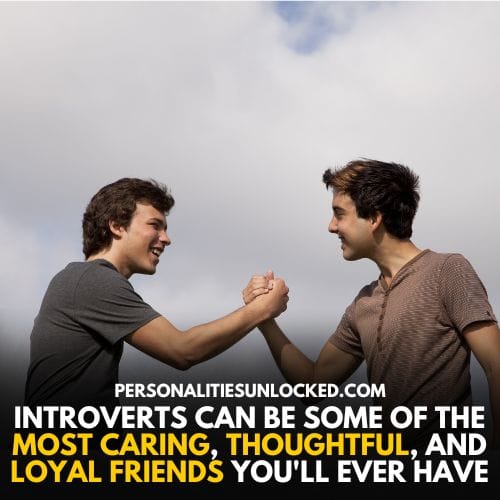
Can introverts be manipulators?
Can introverts be sneaky little manipulators? It’s a fair question, and as an introvert myself, I’m here to explore the answer.
Let’s first address the elephant in the room. Yes, introverts can be manipulators, but guess what? So can extroverts, ambiverts, and every other personality type under the sun. It’s not a trait exclusive to any group of people.
Now, when we think about what it means to be a manipulator, we typically think of someone who is scheming, deceitful, and always trying to get their way. As an introvert, it’s easy to see how that stereotype might be placed on us – after all, we’re often seen as quiet and reserved, so it’s easy to assume we’re up to something.
But here’s the thing: being introverted doesn’t automatically make you a manipulator. Sure, introverts might not always express their thoughts and feelings in the most obvious way, but that doesn’t mean we’re always trying to pull the wool over someone’s eyes. In fact, many introverts are incredibly honest and straightforward in their communication because they value authenticity over surface-level niceties.
That being said, there are introverts out there who might use their quiet nature to their advantage. Maybe they know that people underestimate them, or they use their powers of observation to gather the information that they can use to their benefit. But again, this isn’t something that’s exclusive to introverts – anyone can use their strengths to manipulate a situation.
Here’s a useful video on how to catch someone manipulating you, whether they’re introverts or not:
Being an introvert doesn’t make you a manipulator, and it’s not fair to paint all introverts with the same brush. We’re all unique individuals, and we all have the potential to be manipulative (just like we all have the potential to be kind, caring, and empathetic). So let’s judge people based on their actions and character rather than making assumptions based on their personality type.
The Nature of Toxic Friendships – Difference Between introvert Friendship and Toxic Friendships:
Ah, toxic friendships – the bane of everyone’s social life. As an introvert, I’ve certainly had my fair share of both good and bad friendships, so let’s dive into their differences:
- Reliability: A good introvert friendship is one where you can always count on your friend to be there for you when needed, even if they’re not the most social person in the world. However, a toxic friendship is one where your friend is only there for you when it benefits them, and they might flake out on you when you need them the most.
- Authenticity: Normal friendships are built on honesty and authenticity. You can be yourself around your friend, and they accept you for who you are. In a toxic company, you might feel like you have to put on a facade or pretend to be someone you’re not to fit in.
- Communication: In a fantastic introvert friendship, communication is key. You might not talk every day, but when you do, it’s meaningful and honest. In a toxic friendship, contact might be superficial or nonexistent, and you might feel like you’re not really connecting with your friend on a deeper level.
- Support: Regular introvert friendship is one where you support each other’s goals and dreams. Your friend is happy about your successes and helps you through your struggles. In a toxic friendship, your friend might be jealous or unsupportive of your accomplishments, or they might bring you down when you’re already feeling low.
- Respect: You respect each other’s boundaries and needs. You understand that sometimes your friend needs space or alone time, and you don’t take it personally. In a toxic friendship, your friend might push your boundaries, ignore your needs, or make you feel guilty for not always being available.
- Mutual benefit: Both you and your friend benefit from the relationship. You both enjoy each other’s company and feel fulfilled by the connection. In a toxic friendship, the relationship might feel one-sided, with one person always taking and the other always giving.
- Growth: You both grow and learn from each other. You might challenge each other’s perspectives or introduce each other to new experiences. In a toxic friendship, there might be no room for growth, and you might feel like you’re stuck in the same place, going nowhere.
TL;DR? Here’s a table summarizing the differences between good introvert friendships and toxic friendships:
| Aspect | Good Introvert Friendship | Toxic Friendship |
| Reliability | Your friend is there for you when needed | Your friend is flaky |
| Authenticity | You can be yourself | You have to pretend |
| Communication | Meaningful and honest | Superficial or nonexistent |
| Support | Your friend supports you | Your friend brings you down |
| Respect | Respects your boundaries and needs | Pushes your boundaries |
| Mutual benefit | Both you and your friend benefit | One-sided relationship |
| Growth | You both grow and learn from each other | Stuck in the same place |
So, there you have it – the differences between good introvert friendships and toxic friendships. Remember, just because you’re introverted doesn’t mean you have to settle for toxic relationships. Value yourself and your needs, and surround yourself with people who support and uplift you.
What is a bad trait of an introvert that may come off as toxic?
While introverts are often known for being thoughtful and introspective, there are a few traits that, if taken to an extreme, could come off as toxic to others. Here are three that come to mind:
- Avoidance: While it’s true that introverts tend to prefer alone time to recharge their batteries, if this preference turns into a pattern of consistently avoiding social situations or neglecting friendships, it could be seen as toxic. Relationships require effort and attention, and if you’re constantly avoiding others, you could be sending the message that you don’t value them.
- Self-absorption: Introverts are often very introspective, which can be a good thing – until it turns into self-absorption. If you’re so focused on your own thoughts and needs that you’re not able to see or meet the needs of others, that can be seen as toxic. Make sure you’re listening to others and showing interest in their lives, not just talking about yourself.
- Closed-mindedness: While introverts tend to be reflective and thoughtful, ensuring your reflection doesn’t become rigid is important. If you’re so set in your ways and opinions that you’re not open to new ideas or feedback from others, that can be seen as toxic. Make sure you’re open to different perspectives and willing to grow and change.
Remember, these are just a few potential pitfalls that introverts may face – it’s not to say that all introverts exhibit these traits or that they can’t be overcome with a bit of self-reflection and effort. Remember that introversion is just one aspect of who you are and doesn’t define you or your ability to be a good friend.
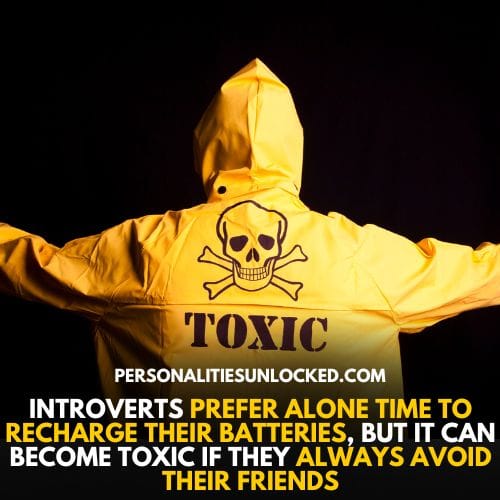
The Impact of Being Around Toxic Friends on Introverts:
As an introvert, you might be inclined to keep to yourself and maintain a small circle of close friends. However, it’s essential to be aware of how toxic friendships can impact your well-being. Here are some potential impacts that come to mind:
- Emotional exhaustion: Introverts are often highly attuned to their own and the emotions of others, which can make them more susceptible to the emotional toll of toxic friendships. Being constantly dealing with drama, negativity, or unsupportive behavior from friends can leave you feeling emotionally exhausted and drained.
- Self-doubt: Toxic friendships can erode your confidence and self-esteem. If your friends constantly put you down, criticize you, or make you feel like you’re not good enough, it can start seeping into your own sense of self-worth.
- Isolation: If you’re in a toxic friendship, you might feel like you can’t talk to anyone else about it. This can lead to isolation and loneliness, which can be especially difficult for introverts who already tend to keep to themselves.
- Increased anxiety: Dealing with toxic friendships can be a significant source of stress, leading to increased pressure. As an introvert, you might be especially sensitive to feeling overwhelmed, so it’s essential to be aware of how your friendships impact your mental health.
- Reduced productivity: If you’re constantly dealing with drama and negativity from toxic friends, focusing on other areas of your life can be difficult. This could impact your work or school performance, making achieving your goals harder.
Remember, it’s important to surround yourself with people who support and uplift you rather than those who bring you down. If you’re in a toxic friendship, it might be time to take a few steps back and reevaluate whether it’s worth the toll it’s taking on your mental health and well-being.
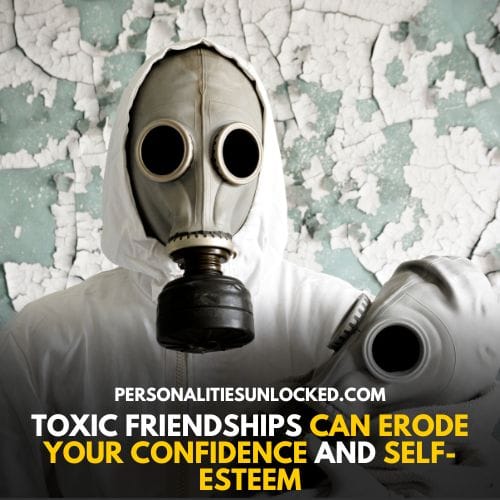
Warning Signs of a Toxic Friendship
As an introvert, you might be more sensitive to the energy of the people around you. It’s essential to pay attention to the warning signs of toxic friendships to protect your mental health and well-being. Here are some potential signs to look out for:
- Lack of mutual respect: In any healthy friendship, respect, and consideration should be mutual. If you feel like your friend is constantly disrespecting, belittling, or putting you down, it’s a clear warning sign that the friendship is unhealthy.
- One-sided dynamic: A toxic friendship often has a dynamic where one person does all the giving, and the other does all the taking. If you find that you’re constantly giving your time, energy, and resources to your friend without getting anything in return, it’s a red flag.
- Constant negativity: It’s natural for friends to vent to each other occasionally, but if all your friend does is complain, criticize, and bring negativity into your life, it’s not a healthy dynamic.
- Lack of boundaries: In a toxic friendship, there may be a lack of boundaries where your friend oversteps your personal boundaries or tries to control your actions and decisions. This can be especially hard for introverts who value their alone time and personal space.
- Unreliability: If your friend is constantly flaking on plans, canceling last minute, or not showing up when they said they would, it’s a clear sign that they don’t value your time or friendship.
- Gaslighting: It’s a kind of emotional manipulation where a person tries to make you doubt your own reality or experiences. If your friend frequently makes you feel like you’re overreacting or being too sensitive, it’s a warning sign of gaslighting.
If you come across any of these warning signs in a friendship, it might be time to reevaluate the dynamic and consider whether the relationship is worth your time and energy.
Tips for Navigating Toxic Friendships
I know dealing with toxic friendships can be a drag, but we have some tips to help you navigate the rough patches. So, grab a cup of herbal tea, and let’s get started!
- Set Boundaries: Let’s be real; as introverts, we’re known for our love of alone time. But, sometimes, our toxic friends just don’t get it. So, set boundaries and let them know when you need your personal space. Remember, saying “no” and putting yourself first is okay.
- Communicate Openly: We get it; talking about your feelings can be hard – especially for introverts. But it’s important to communicate openly with your friend about how their actions make you feel. Trust me. They may not even know they’re being toxic!
- Offer Alternative Solutions: Instead of just shutting down, offer alternative solutions to your friend’s behavior. Maybe suggest different activities that you can do together or a new way to approach your conversations. Your extroverted friend may be more receptive to a positive solution.
Dealing with toxic friendships can be a bummer, but by setting boundaries, communicating openly, and offering alternatives, you’ll be on your way to a healthier relationship. Remember, it’s crucial to prioritize your well-being and always respect your approach.
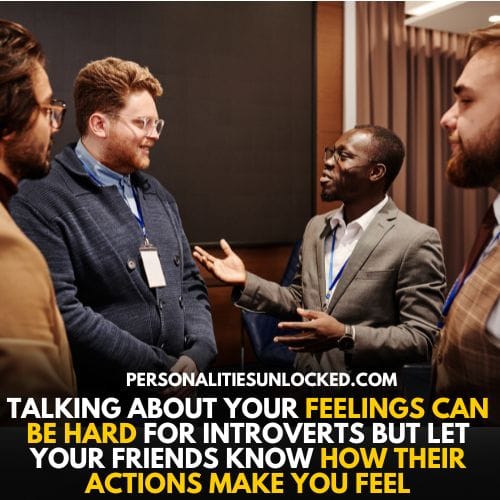
And don’t forget. Introverts make great friends – as long as they’re not toxic! So, keep an eye out for those warning signs and surround yourself with people who uplift and support you.
Parting Words:
Just like extroverts or ambiverts, introverts can also display toxic friendship traits. But let’s be honest, who hasn’t had their moments of being a not-so-great friend? It’s super crucial to remember that being an introvert doesn’t automatically make you a bad friend.
It all comes down to individual personalities and behaviors. And if you notice some toxic traits in yourself or your introverted friends, don’t worry – there are ways to work on those behaviors and create stronger, healthier friendships.
So, whether you’re an introvert, an extrovert, or somewhere in between, don’t let labels define your friendships. Focus on being a kind, supportive, and respectful friend, and surround yourself with people who do the same. And always remember, it’s never too late to work on yourself and your relationships.